Freelance vs. in-house SEO salary: Insights from the 2025 survey
SEO salaries vary a lot, but how much of that comes down to whether you freelance or work in-house?
We conducted a global survey of SEO professionals that asked them how much they make, how often they get raises, and how satisfied they feel at work.
The results show that in-house SEOs (those employed by companies, agencies, etc.) tend to earn less than freelancers overall. But not everywhere, and not always. Their income still varies based on where they live, how much they work, and what kind of SEO they do.
-
SEO freelancers out-earn in-house SEOs by a median of 14.4% ($58,000 vs. $50,675 for employed specialists).
Moreover, a significant percentage of freelancers break into high-earning brackets, with nearly 14% earning over $150K annually.
-
In the EU, freelancers enjoy a 28.6% higher median income than employees.
This market tends to reward independent work more generously than traditional in-house roles.
-
The U.S. bucks the global trend; freelancers there earn 25% less than in-house SEOs on average.
This is the only region where in-house employment offers higher salaries.
-
Almost 40% of freelancers feel their income is competitive, compared to only 24% of in-house SEOs.
Optimism is the strongest in the UK, where up to 50% of freelancers believe their earnings stack up well against industry standards.
-
Freelancers rate their job satisfaction higher overall, with the UK leading the charge.
In the U.S., however, satisfaction levels are nearly equal between both work models.
-
In the past year, 67.5% of in-house SEOs received a salary increase, versus 51% of freelancers.
When examining raise amounts, the advantage for in-house roles continues: 47.3% received increases of 1–10%, while only 23.5% of freelancers matched that.
-
Just 13.7% of freelancers stick to a standard 40-hour workweek, compared to 50% of in-house SEOs.
Instead, many freelancers opt for part-time schedules, valuing the freedom to build their own workdays.
-
Freelancers working 20 hours a week earn significantly more than in-house SEOs—about 64% more.
When it comes to full-time hours, the advantage shifts (with in-house SEOs earning 18% more than freelancers).
Salary survey overview: Participants, methodology, and more
This SEO salary analysis is based on data from 279 SEO professionals across various regions and experience levels. The goal of the survey was to compare compensation between in-house SEOs and freelancers.
The survey was conducted via an online questionnaire. Respondents were asked to provide details on employment type, specialization, hours worked, regional location, and salary figures.
To ensure meaningful comparisons, we focused on key regions (U.S., European Union (EU), U.K. & Ireland). Regions with fewer responses (e.g., Canada, Australia) were included in global statistics but excluded from regional breakdowns.
Similarly, responses from underrepresented roles (e.g., C-level, interns) were excluded from certain breakdowns to maintain data integrity.
Disclaimer: While the sample size of 279 responses may not be large enough for firm conclusions, we believe the results still offer helpful insights into general salary trends for in-house SEOs and freelancers.
What is the median salary of freelancers and in-house SEOs?
Globally, the numbers tell a clear story: freelancers make more. The median income for freelancers is $58,000, compared to $50,675 for in-house SEOs. That’s a 14.4% increase in favor of freelancers.
Here’s a salary breakdown for in-house SEOs and freelancers by range:
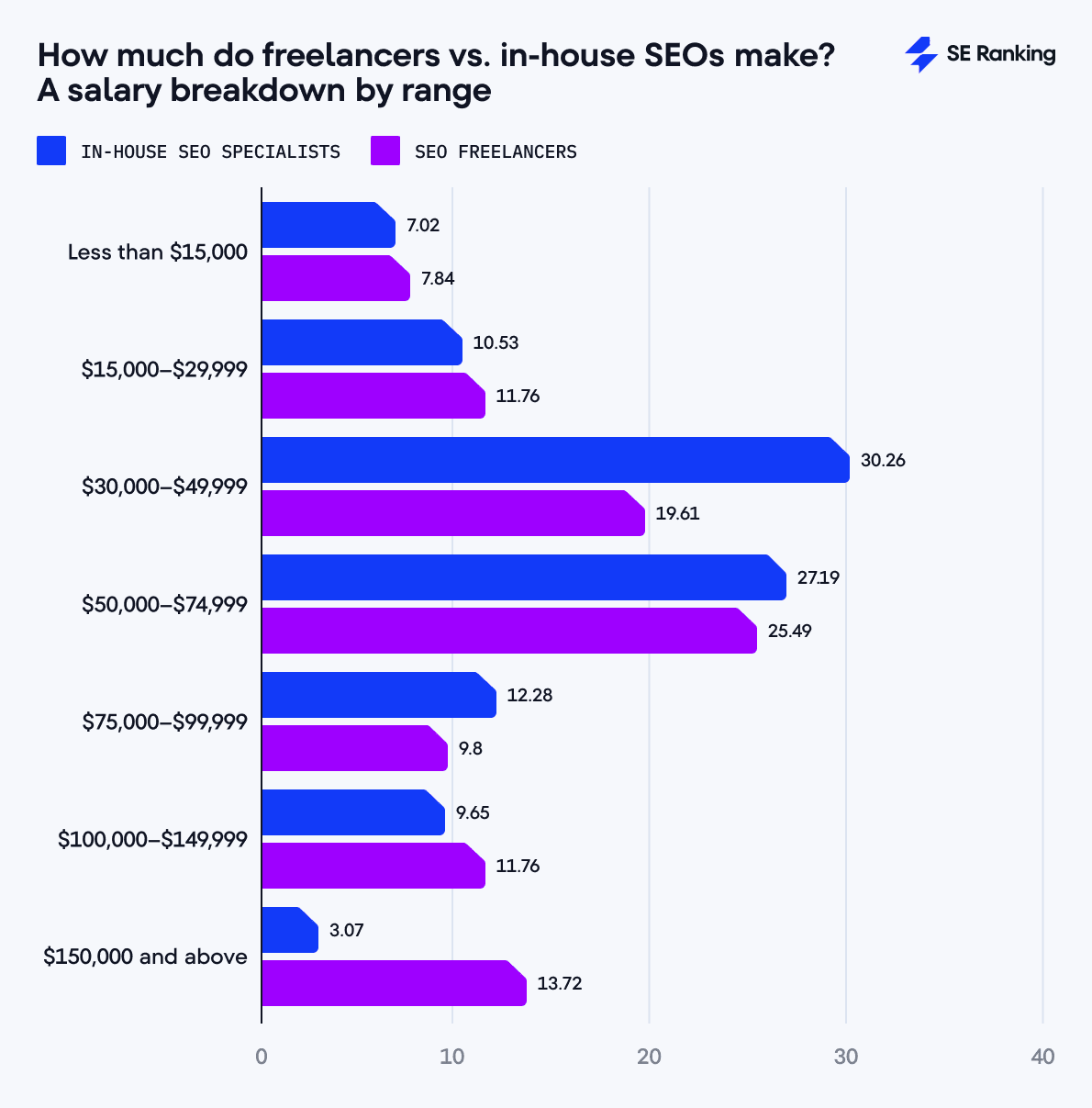
And indeed, that’s exactly what the data shows:
- Almost 14% of freelancers earn over $150,000 per year, compared to around 3% of in-house SEOs. This is nearly five times the percentage of employees in that bracket.
Looking at average salaries, freelancers again come out ahead, and this time by a much wider margin: $84,322 vs. $62,318 for in-house SEOs (a staggering 35.3% difference). This suggests that while some freelancers may earn less, a significant number are doing exceedingly well, pulling the average up.
So while freelancing might come with more variability, the potential for high earnings is clearly greater.
What are the regional salary differences among freelancers and in-house SEOs?
How much you earn as an SEO professional significantly depends on where you live and how you work. Based on our survey data, here’s how median annual salaries compare between freelancers and in-house SEOS across key regions:
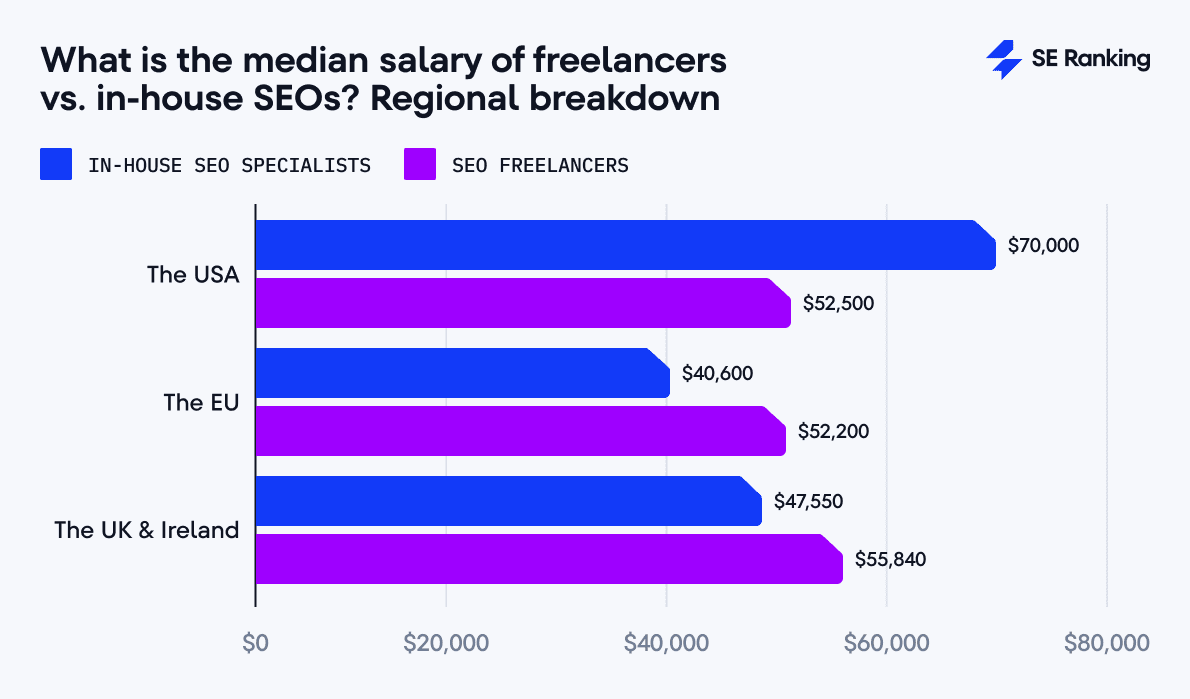
So, what does it all mean?
- Here’s the first big surprise: freelancers in the U.S. actually earn less than in-house SEOs (and it’s the only region where that’s the case). Even more striking is the size of the gap: on average, U.S.-based freelancers make 25% less than in-house SEOs.
- In the EU, the dynamic shifts. Freelancers in the region report a 28.6% higher median income than full-time employees.
- Similarly, in the UK & Ireland, freelancers outperform employees by 17.4%.
To sum up, the freelance dream is alive and well, but it’s not one-size-fits-all. In some markets, it pays to build your own business. In others, the stability of a paycheck still wins the day.
How do stress levels differ between freelancers and in-house SEOs?
Work-life balance is often cited as a major benefit of freelancing, but does it really lead to lower stress?
The answer: not necessarily.
Average stress levels are nearly identical—3.16 for freelancers vs. 3.23 for in-house SEOs (on a 5-point scale). But the way stress is distributed tells a deeper story.
Freelancers are more likely to experience both extremes: they have a larger share at the highest stress level (13.7% vs. 9.6%) but also report low stress more frequently.
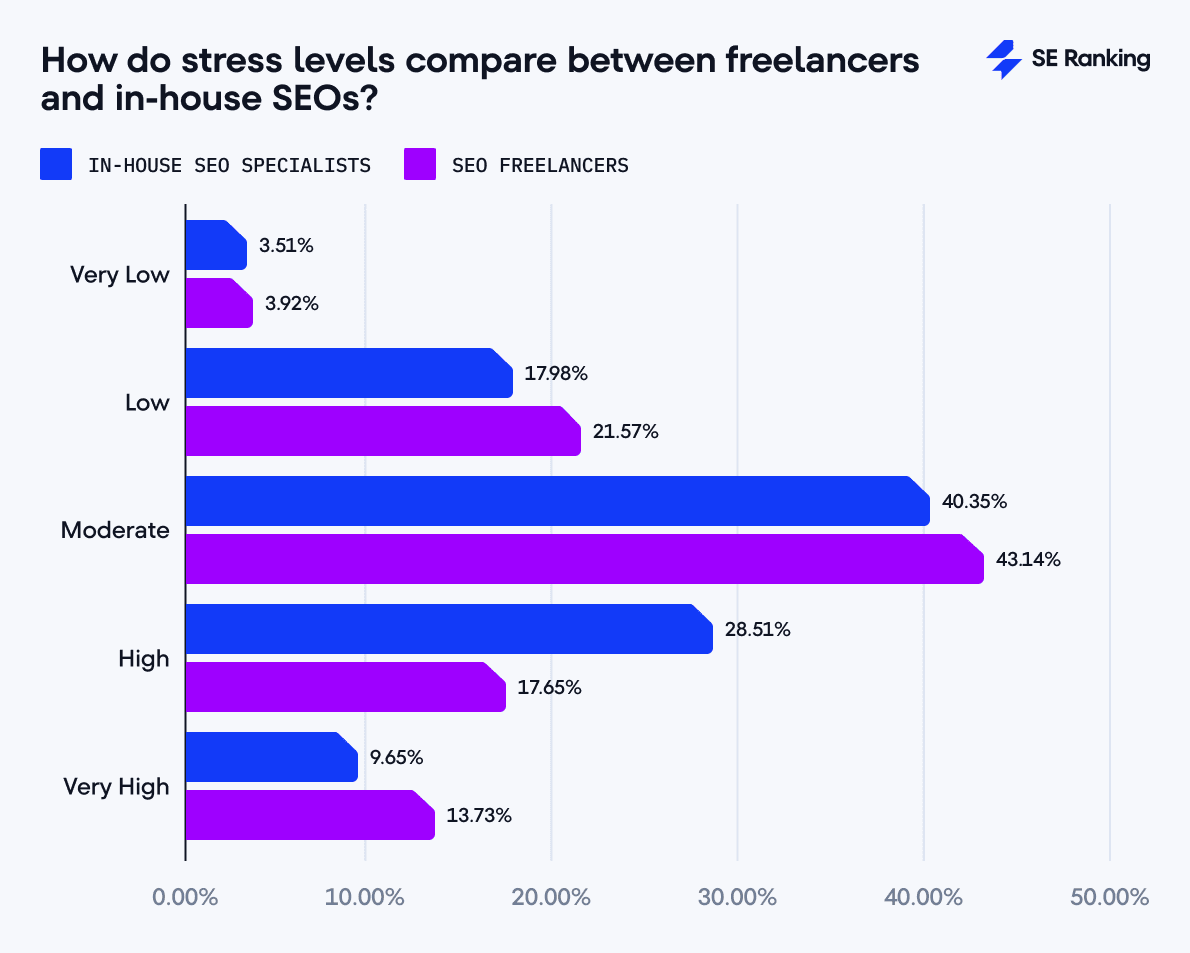
This implies that no work model is inherently “easier”; they just come with different types of pressure. Freelancers face volatility and isolation, while employees often deal with hierarchy, bureaucracy, and limited control.
Do freelancers and in-house SEOs consider their salaries competitive?
When it comes to how SEO professionals feel about their earnings, freelancers are notably more upbeat. Nearly 40% believe their income is competitive, while only 24% of full-time employees feel the same.
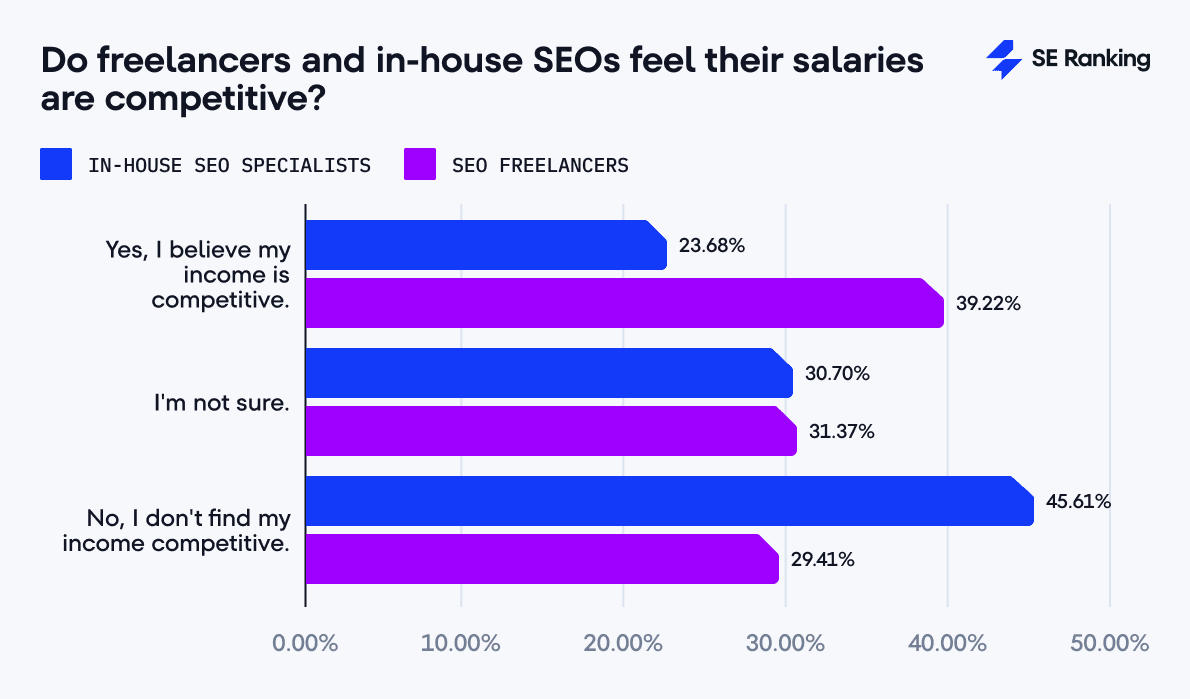
In the U.K. and Ireland, that optimism is even stronger—50% of freelancers there feel their pay stacks up well against industry standards. The EU follows with a 47.4% share of freelancers who believe their income is competitive.
In contrast, just 20% of U.S.-based freelancers share that confidence. This aligns with earlier findings that U.S. freelancers earn 25% less than full-time employees. This is a market where freelancing may not offer the same financial rewards or perceived value.
How does job satisfaction vary among freelancers and in-house SEOs?
Across the board, freelancers report higher job satisfaction, scoring an average of 3.73, versus 3.38 for in-house SEOS. Over 60% of freelancers are either satisfied or very satisfied with their job, compared to 48% of in-house SEOs.
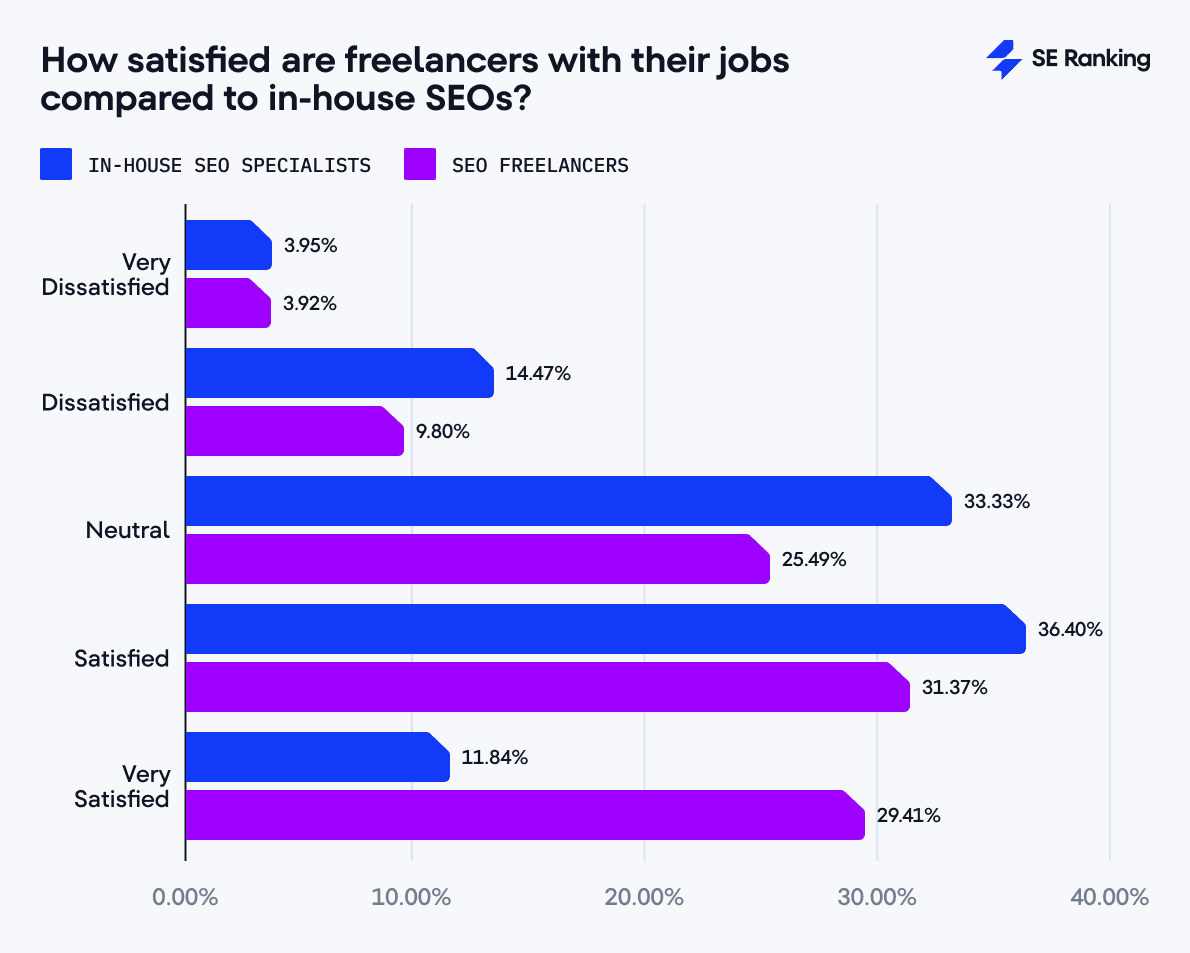
Again, regional nuances matter. In the U.K. and Ireland, freelancers rate their satisfaction at a solid 4.2, outshining in-house SEOs by over a full point. In the EU, the gap is smaller but still present. The U.S. market shows near parity, with freelancers only slightly ahead.
Do freelancers and in-house SEOs receive annual salary increases?
While freelancers may earn more on average, they’re less likely to report annual pay increases.
49% of freelancers reported no income increase in the past year, which is significantly higher than the 32.5% of in-house employees. This indicates greater income stagnation among freelancers.
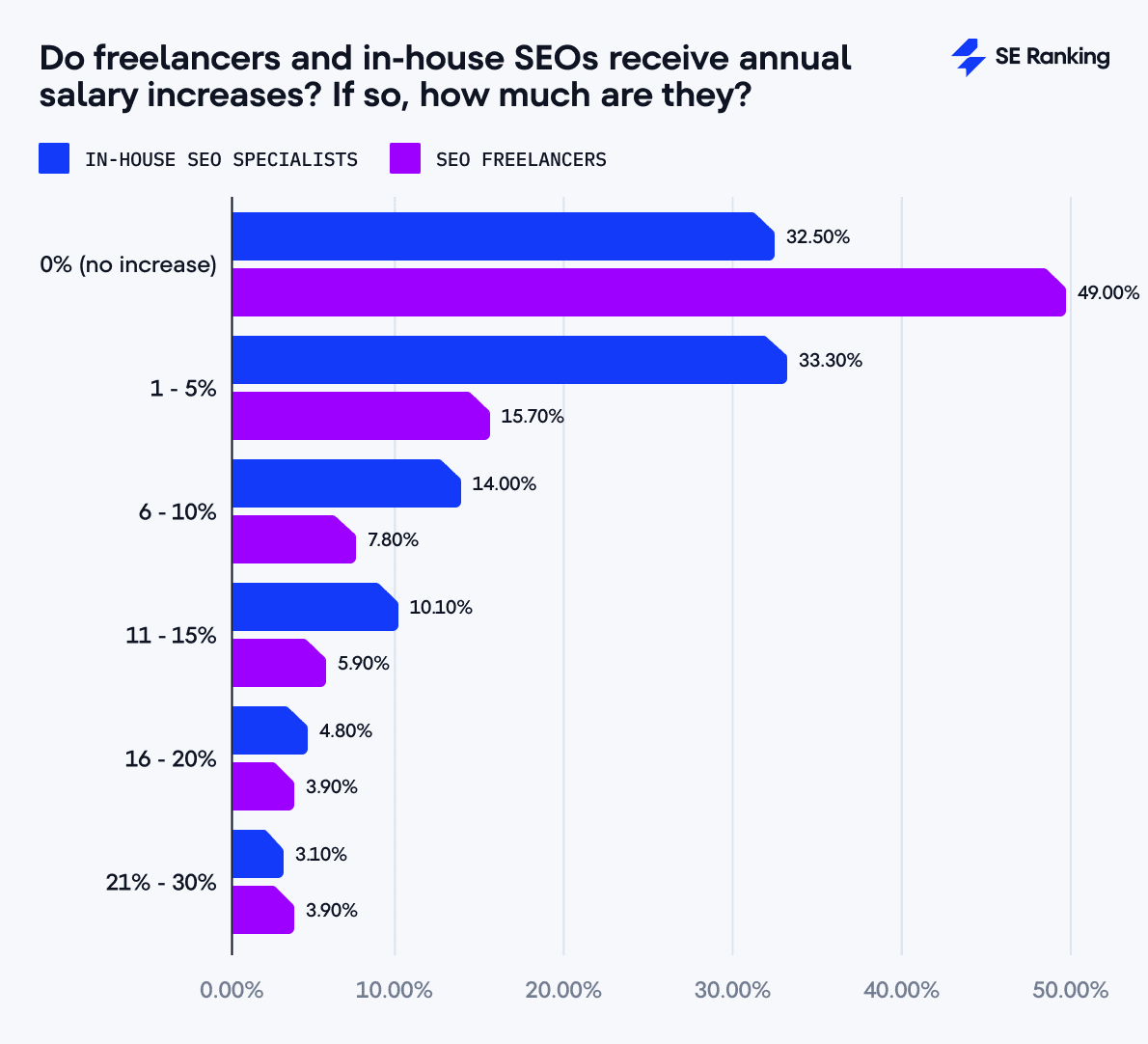
The majority of in-house SEOs (47.3%) reported raises in the 1–10% range, compared to just 23.5% of freelancers. This suggests employees are more likely to receive routine, incremental salary increases.
Regionally, the difference is starkest in the US:
- Only 30% of freelancers reported a raise vs. 60% of in-house SEOs. In other words, U.S. freelancers are twice as likely to go without a pay increase.
- In the EU, however, the gap nearly disappears: 68.4% of freelancers and 67.2% of in-house SEOs received raises.
Which SEO responsibilities do freelancers and in-house SEOs usually handle?
The types of responsibilities freelancers and employees take on reveal where each model thrives. Freelancers are far more likely to specialize in consulting (51% vs. 35.5%) and local SEO (51% vs. 38.6%). They’re also slightly ahead in technical and general SEO.
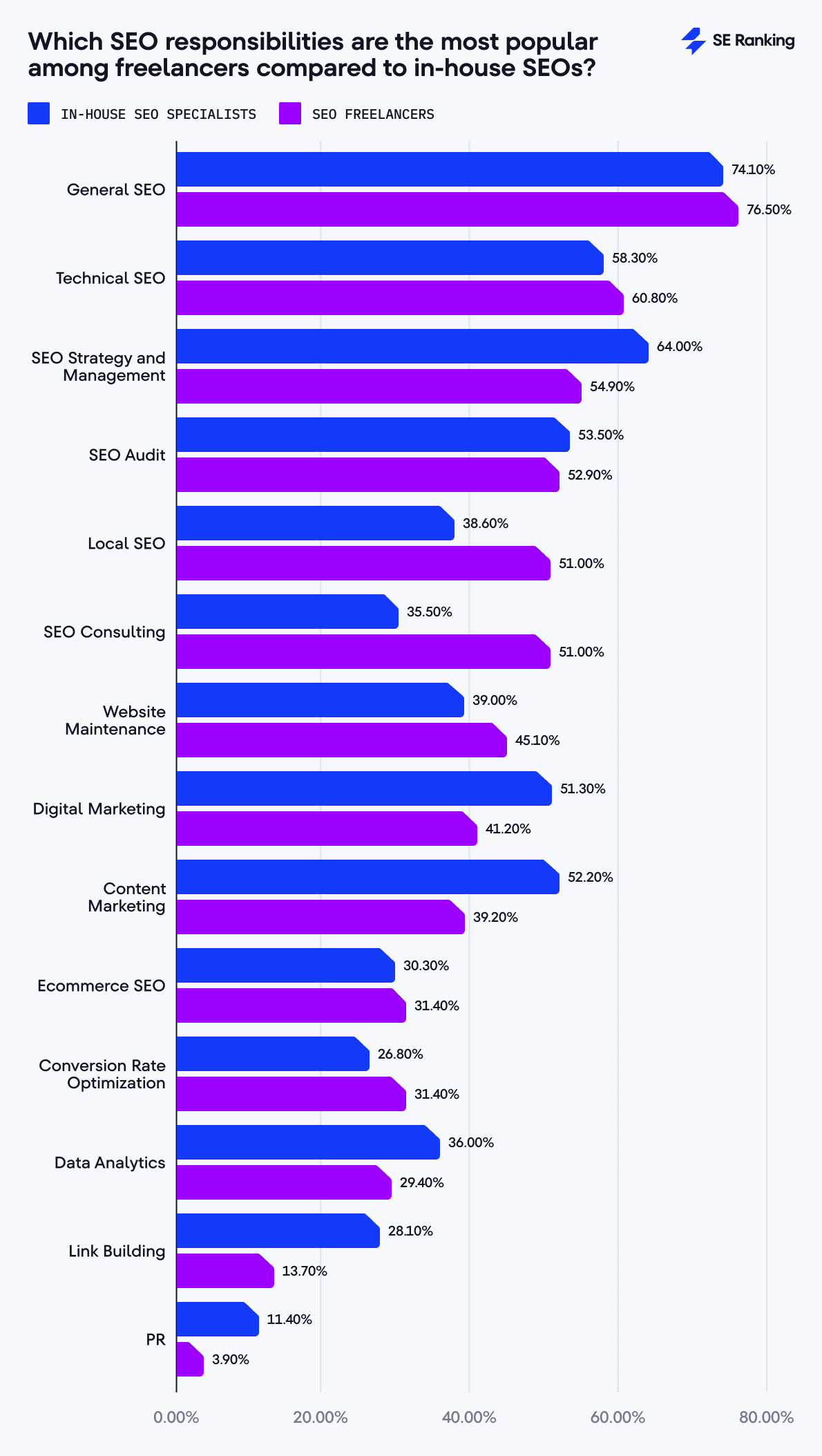
On the flip side, full-time employees dominate areas like SEO strategy and management (64% vs. 54.9%), content marketing, and especially link building, where they more than double freelancer representation (28.1% vs. 13.7%).
This division of responsibilities shows that freelancers thrive in hands-on, specialized roles, while employees are more commonly embedded in strategic, content-driven, and team-based functions.
How do working hours differ between freelancers and in-house SEOs?
Here’s where freelancing offers one of its biggest lifestyle advantages: flexibility.
Among those surveyed, 50% of in-house SEOs work a standard 40-hour week, while only 13.7% of freelancers do the same. Freelancers tend to have much more flexible schedules:
- 9.8% work fewer than 20 hours per week
- 17.6% work exactly 20 hours
- 13.7% clock in between 21 and 34 hours
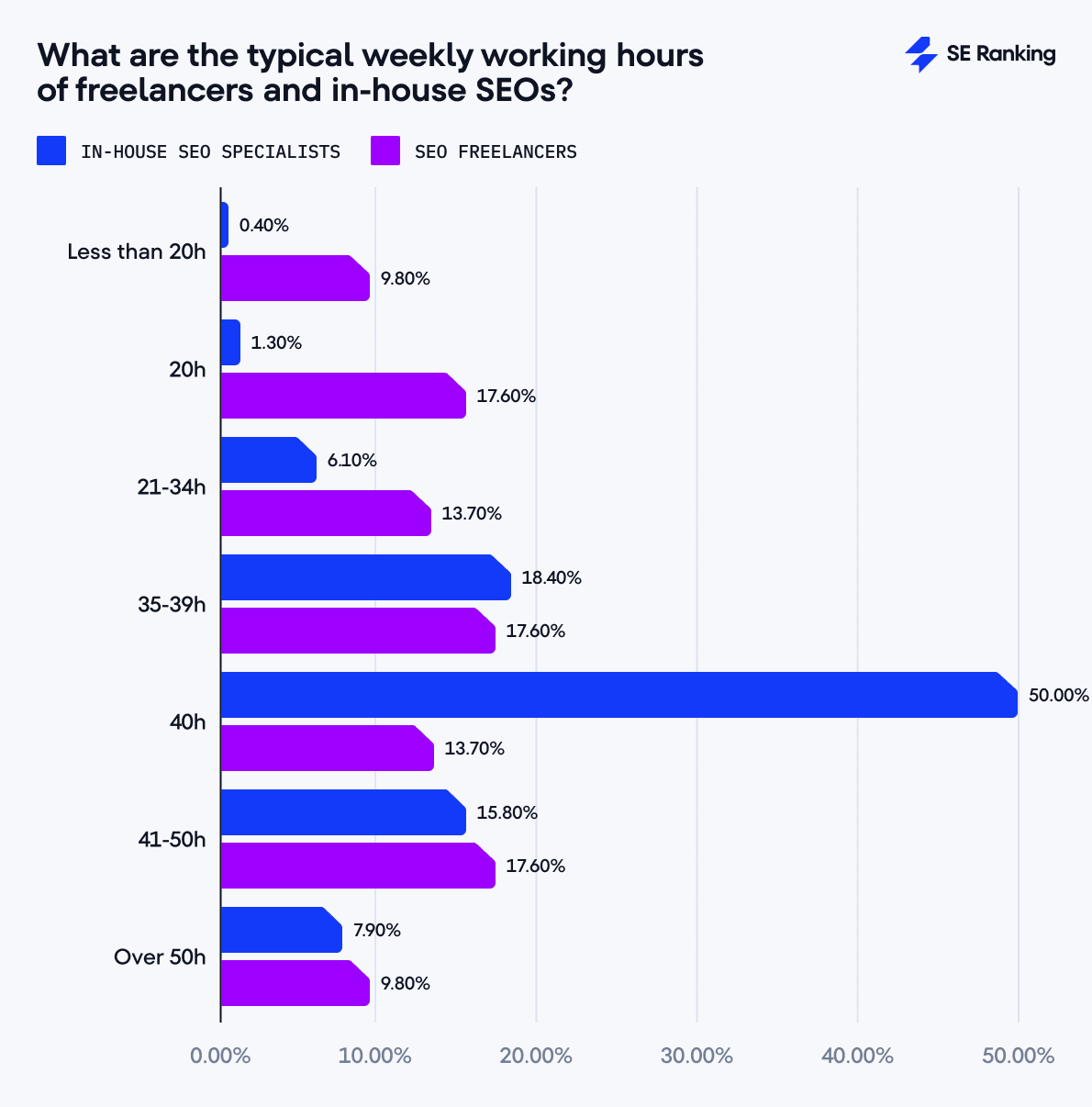
How do freelance and in-house SEO salaries differ by weekly hours worked?
Looking at income by hours worked reveals some surprising insights. Freelancers working just 20 hours a week earn an average of $87,022, while in-house SEOs working the same hours make $53,213 (that’s about 64% less for freelancers).
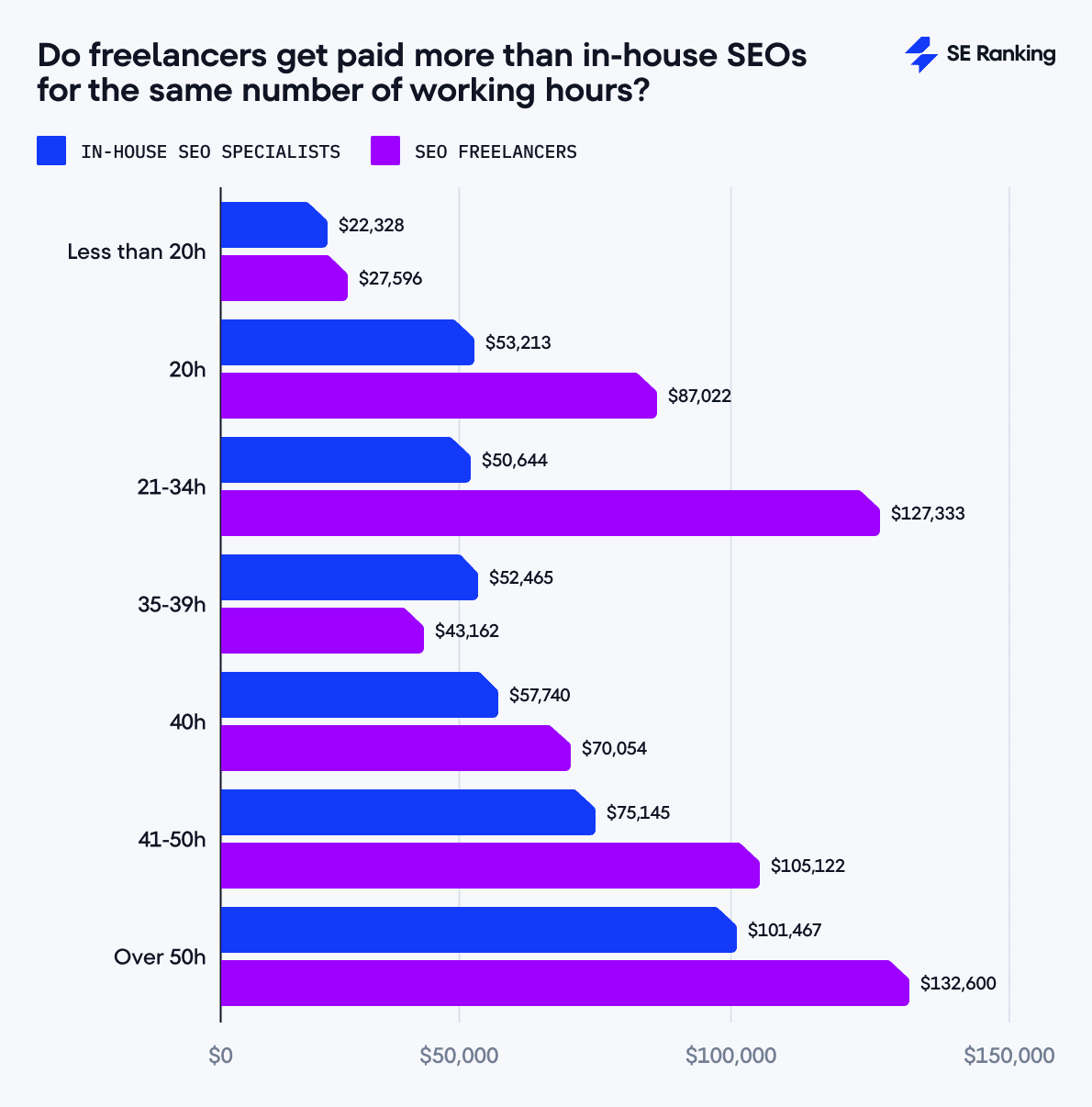
The biggest gap appears among those working 21 to 34 hours per week. In this range, freelancers earn a staggering $127,333 on average, compared to just $50,644 for employees (over 150% more!).
But interestingly, the trend flips for near full-time schedules. Freelancers working 35 to 39 hours per week actually earn less than employees: $43,162 vs. $52,465, or about 18% less. This is the only group where employees earn more.
Possibly, this is because freelancers in this range are working full-time hours without raising their rates or taking on the added benefits that come with employment.
Conclusion
To sum up, SEO freelancers generally earn more than in-house SEOs (especially in the EU and the U.K.) with higher averages and more top earners. But income varies widely, and in the U.S., employees actually come out ahead.
So, while freelancing leads in earnings overall, it’s a game of highs and lows. Where you live, how much you work, and the type of SEO work you do all play a major role in the outcome.

